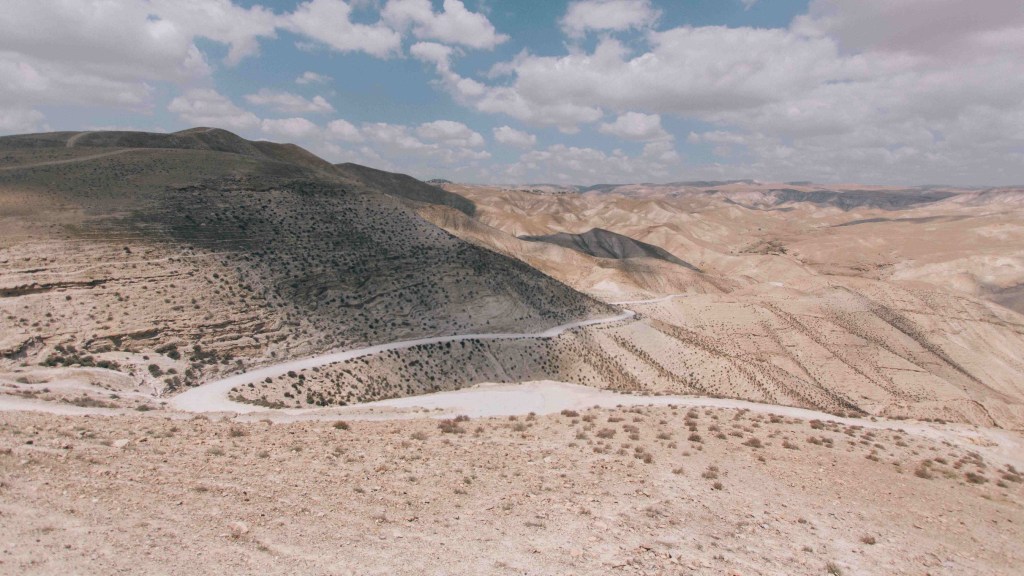Shifra’s Story is a story of advent, written through the lens of a birth assistant. It is unique in that it is an attempt to retell the Christmas story through a female lens, focusing on the very real, very messy parts of the story that the gospels skip over. This is chapter 2 of 6.
As our journey began, I worried about making such a long trip on our own. I worried about bandits, and ambushes; I worried that we would meet soldiers, or that we would find ourselves lost in the middle of dry scrub, with no water. But it turned out Jacob had even thought of these potential dangers. He had talked to a man heading through just last week, who told him there were several families meeting up in Capernaum (the large town nearby) to form an impromptu caravan, and Jacob had chosen this morning to leave so that we would have the day to reach Capernaum to allow us to join with the others there for the long journey.
I was overjoyed at this new revelation! Not only would this mean protection and direction, but it would also mean company – company for the children, who I worried would quickly tire of each other; company to help with the chores of traveling, especially cooking out in the open and pitching tents each night we had to camp out; and female company to help pass the time on the long journey.
The first few days went smoothly. We seemed to fall into an unspoken rhythm quite quickly with the other five families, rising before dawn so that the women could fetch water, light the fire, and bake bread for the day, while the men struck camp, and the older children packed everything away. Then we would walk through the daylight hours, stopping during the hottest part of the day to have some more water and bread and to rest in some shade, if we could find it. The journey was uneventful in terms of robbers or bandits, but the company I had hoped for never quite happened. The other woman apparently knew each other already, and seemed happy enough to allow me to share their fire, and help them fetch water from the local wells, but that was all. They seemed to have little interest in expanding their circle of conversation to include another, and so I often found myself walking near the back of the group, listening to Samuel as he took in all of the new sights and sounds along the way.
It was just southwest of Nazareth that we met up with a young couple, and another family. We had seen them the night before when our group joined up with several other caravans, and there was much jostling and repositioning going on that morning as we tried to sort out who needed to get to where, and which was the best group to go with.
We needed to travel south through Jerusalem, towards Bethlehem. Having lost all but two families from our original group, we were feeling small in size, so were thankful for the added protection James and his family of four teenage boys, and Joseph, with his carpenter’s tools, brought for us. I noticed right away that young Mariam was pregnant – probably about 8 months, I thought at the time, although some of these young moms carry so small its hard to tell.
After days of walking with Samuel, and because I’ve always been the mothering sort (and couldn’t help but feel that this could be my Ruth in a year or two) I found myself walking beside Mariam as we began the journey south.
Although the journey from Nazareth to Bethlehem should have been 80 miles, we couldn’t take the direct route straight south. The Way of Shur might have been the shortest distance between the two points, but it would have demanded we walk directly through Samaria – and our religious leaders had made it more than clear that even travelling through their territory would make us ceremonially unclean – and make it impossible for us to partake of the Passover meal without first making a sin offering. Instead we found ourselves walking south to Ginae, west to Salim and across the Jordan river, then following the river south to cross over again just as our ancestors had done, across from Jericho, before heading up and through the mountains to Bethany and Jerusalem and finally south to Bethlehem. What might have taken our menfolk four or five days of steady walking if they could have travelled directly and at their own pace, instead would take us between a week and a week and a half. But we had no choice.
We chatted about all sorts of things on that first day. The weather – unusually warm for this early in the spring; the census – how inconvenient the timing was with it being time to plant the crops and do the lambing; the Samaritans, and how abominable they were to think they could worship God on Mount Gerizim, or to think that they were following the true Torah. Notably we never seemed to talk very much about Mariam’s wedding (as newlyweds so often want to talk about), nor did she have much to say about their marriage so far. Perhaps she was simply being demure, I wasn’t sure.
The day seemed to go by fairly quietly for Mariam. The 20 miles we travelled seemed more than she should be doing, but what choice did we have? It was obvious to all of us older adults that having a baby on the side of a deserted road wasn’t going to make things safer, and although she seemed too tired to keep going at times, Mariam somehow managed a steady trudge. I was glad the girl had mettle – it would make the labor smoother when the time came.
That night we made camp a bit early, as it was the Sabbath, and took time to bake extra bread, and gather extra water before the sun went down. We had been fortunate enough to camp on the edge of a small village, and so in the morning, the men walked the half mile into the village to worship at the synagogue, while us women sat in camp with the children.
While we were sitting there, the conversation turned to the Roman occupation. Deborah (James’ wife) said what all of us were thinking. “Wouldn’t it be wonderful if the Messiah came this year? Wouldn’t it be amazing if God would hear our cries and rescue us from our oppressors? Our leaders tell us the promises are true – that we must simply hold on, but I think if we hold on against these Romans much longer there won’t be much of Israel left to hold on to!”
“What do you think the Messiah will do? Will he come with a thousand angels? Will he wipe the Romans away with fire? Will he raise up an army and drive them into the sea?” I wondered aloud, with a touch of cynicism in my voice.
“And what will bring this Messiah?” asked Esther, another woman in our group. “Will it be when we can all keep the Torah perfectly? Will it be when the Sadducees and Pharisees can agree about the after life? Will it be when we are all slaves again? What will it take for God to hear our groaning?”
Mariam, who had been resting with her eyes closed sat up and said, very firmly:
“The Lord, the God of Israel is blessed – he will come and set his people free. He will set the power of salvation in the center of our lives, and in the very house of David his servant, just as he promised long ago through the preaching of his holy prophets: deliverance from our enemies and every hateful hand; mercy to our fathers, as he remembers to do what he said he’d do, what he swore to our father Abraham – a clean rescue from the enemy camp so we can worship him without a care in the world, made holy before him as long as we live.”
Her answer came so unexpectedly that we all turned to stare at this young woman. She was 15, maybe 16, and the conviction with which she said these words astounded us all.
“Where did you learn that? Who told you that?”
“My cousin, who serves his turn at the temple told me. He sang it in fact, and the words burned in my heart as I heard it, and so I asked him to repeat the song again and again until I had memorized it. I like it, you see. It tells a story of hope. A story of rescue. It’s so different from what the rabbis in our village say, or what the men say at the banquets, and I wanted to keep it always in my mind.”
This seemed to stop the flow of questions back and forth, and after nodding politely we each wrapped ourselves in our tunics to have a sleep in the shade. But I wondered about this young woman. Before, she had seemed unremarkable – like any other young bride. But she had shown that she had some surprises tucked inside that head of hers. I wondered, too, about her faith in this hopeful future. I, certainly, had none of that left. I simply did not believe the stories any more. It wasn’t possible. No one – not even this ‘Messiah’ was big enough to rescue us from the Romans. It felt like there would never be a hope or a future. Was it possible that there was any truth to these claims?


Leave a comment